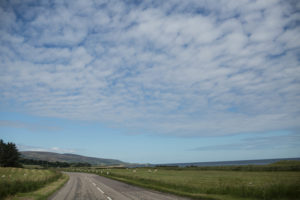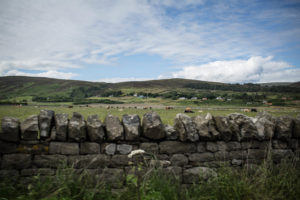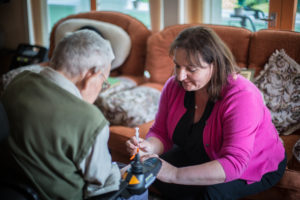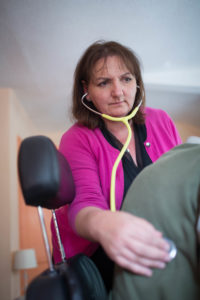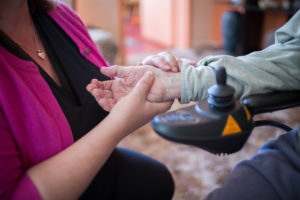Michelle Duffy
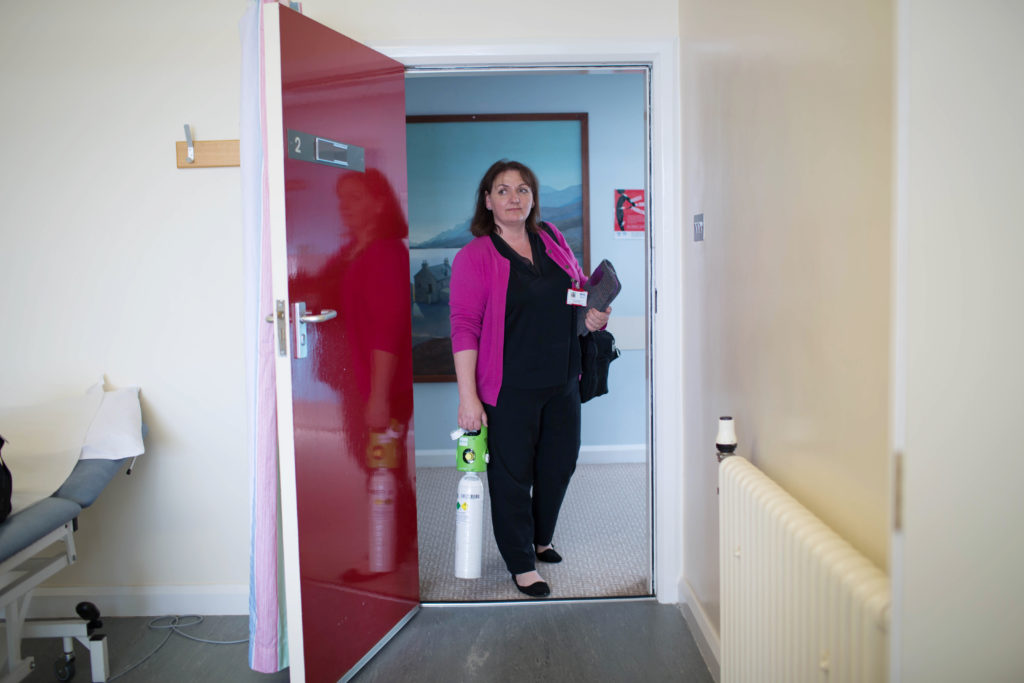 Michelle Duffy has one objective – to ensure that people living with disabling breathing problems in some of the most far-flung parts of North West Scotland can receive the same high quality evidence-based care as their counterparts in towns and cities.
Michelle Duffy has one objective – to ensure that people living with disabling breathing problems in some of the most far-flung parts of North West Scotland can receive the same high quality evidence-based care as their counterparts in towns and cities.
It may sound simple but Michelle, an Advanced Practice Respiratory Nurse with NHS Highland, operates across an area almost the size of Belgium. From her base in Inverness, she covers Caithness, Sutherland, Skye, Lochalsh and Lochaber, offering specialist nursing care and advice. Her patients, currently 150 people with severe respiratory problems, live scattered over many thousands of square miles.
Most of the people on Michelle’s caseload are elderly and have conditions such as chronic obstructive pulmonary disease (COPD), pulmonary fibrosis, emphysema and bronchiectasis, which make it difficult to breathe.
“There are few fancy tools we can use, or operations we can give, and limited medication, so we have to work with people to manage their symptoms,” says Michelle, who encourages her patients to stop smoking and to keep active, and works with others on the healthcare team, including physiotherapists, to reinforce breathing control techniques. “Life can be very difficult for people who are struggling with breathlessness every day, but there are many things that can make life easier. I’m very fortunate to be able to spend a bit more time with patients, which helps when it comes to listening to how they feel.”
Since it started eight years ago there is evidence that the nurse-led service is improving the quality of care people receive, extending their lives, and giving them back control. In addition, Raigmore Hospital in Inverness has noticed a reduction in emergency admissions, and there are fewer ‘blue-light’ calls.
The impact is attracting international interest: In September, Michelle and two colleagues presented at the European Respiratory Science conference in Milan, on the COPD Discharge Care bundle. Devised in Caithness General Hospital and adopted by Raigmore, this approach has been a part of helping cut in-patient stays by half. “Investing in good care in the community is sound common sense,” she says. “We need to be able to support people to manage their condition at home, helped by the whole community healthcare team.”
Recognising and supporting innovation in community nursing practice is the purpose of Queen’s Nursing Institute Scotland, which has recently appointed its first Queen’s Nurses in 50 years. Michelle is one of them, and she is looking forward to using the title to help her influence change. “Pulmonary rehabilitation is a service that really works, and yet there’s evidence that we’re only reaching 8% of the people who might benefit,” she says. “More GPs need to refer to rehab early, and I want patients everywhere to be asking, ‘why can’t I get that service too?’”
Michelle, who lives on the Black Isle with her husband and two teenage children, worked with respiratory patients when she was based on the wards at Raigmore.
When the opportunity came up to develop community-based pulmonary rehabilitation in Invergordon, Michelle went for it. “It was just the best thing that ever happened,” she says. “I was fortunate enough to be working with a team that was interested in self management, and I felt I had the support and permission to go and see how we could make things better in the community.”
Working with patient representatives, GPs and other colleagues, and borrowing from best practice elsewhere, Michelle developed COPD ‘traffic light’ self-management plans. Patients now hold their own record cards, which helps them to follow their exacerbation patterns. This encourages them to see when they are doing well and to recognise early warning signs. So successful are the plans that the charity Chest, Heart and Stroke Scotland (CHSS) now uses the same model nationwide.
Michelle spends a great deal of her time travelling to different centres across the north west Highlands, running clinics and making home visits. The first Tuesday in the month is spent in Golspie and today, having completed her clinic at the town’s Lawson Memorial Hospital, she is dropping in to see a new patient. 87-year-old Allan has one-and-a-half lungs because of childhood pneumonia, and suffers from bronchiectasis, which has been deteriorating recently.
Following a recent visit, Michelle arranged for oxygen to be provided for Allan at home. Today she is doing a follow-up assessment, including an arterial blood gas test, to check how he is doing. Until recently, that would have involved a 50-mile round trip to hospital, but Michelle has equipment that allows her to do it on-the-spot.
“Inverness is a long, long way to go for tests and check-ups, and I find the journey extremely difficult,” he says. “Michelle comes to me and sees to my respiratory needs. She has got things underway for me that are certainly helping, like the oxygen. I use that as much as I can.”
As an Advanced Practitioner and specialist respiratory nurse, Michelle can assess, prescribe and treat. She has a direct line to doctors in Raigmore Hospital if she needs advice, and operates autonomously the rest of the time. “It is a really rewarding role,” she says. “I am pushing out the boundaries of nursing practice in this field, and the patients really like being cared for closer to home.”
Michelle makes a point of regularly checking the experience of the people she works with, including carers. She sends out questionnaires, and takes part in national surveys; she’s involved in setting up an NHS Highland patient engagement forum, Breathing Matters, along with the local CHSS Voices group, which offers education and peer support. “We need to know where the people who use it want to take the service, not assume that we know best,” says Michelle. “That’s how I see change happening – from the front.”
Most of Michelle’s patients are referred by the hospital or GPs. And when it comes to diagnosis, there is an enormous difference between rich and poor. “We know that the greatest burden of respiratory disease is in the most deprived communities, yet these patients don’t often go to pulmonary rehab, and we need to understand why,” says Michelle. “They don’t go to see their GP so much, and if they have been a smoker, they tend to think they’ve brought it upon themselves and deserve it. I want them to know that’s not the case.”
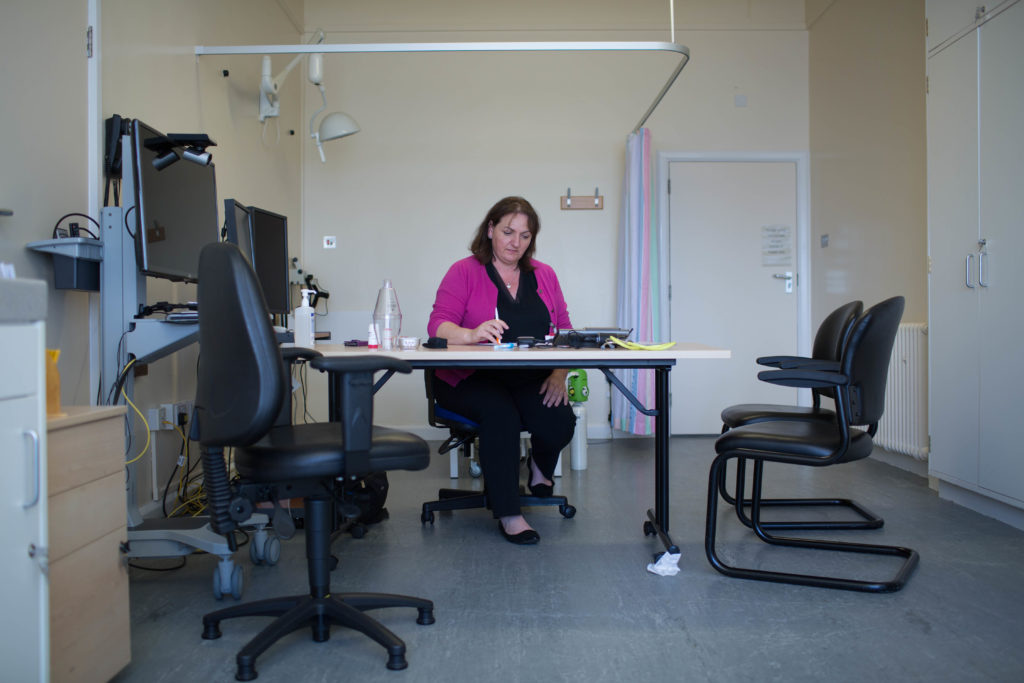 Working closely with national charities, as well as community-based support groups, Michelle raises awareness of respiratory disease, and the importance of early diagnosis. They take their spirometer, for measuring lung capacity, into supermarkets and shopping centres to offer on-the-spot tests, and use every opportunity to spread the word. “This area has a lot of people who used to work in heavy industry, and were exposed to environmental causes of lung disease,” she says. “If they spot the signs and start treatment quickly, their prospects of living well for longer are significantly improved.”
Working closely with national charities, as well as community-based support groups, Michelle raises awareness of respiratory disease, and the importance of early diagnosis. They take their spirometer, for measuring lung capacity, into supermarkets and shopping centres to offer on-the-spot tests, and use every opportunity to spread the word. “This area has a lot of people who used to work in heavy industry, and were exposed to environmental causes of lung disease,” she says. “If they spot the signs and start treatment quickly, their prospects of living well for longer are significantly improved.”
Rehabilitation is Michelle’s most powerful tool. She works with patients one-to-one to set goals and devise exercise programmes, supporting lung function and overall strength. “Each person is different,” she says. “One of my patients is now cycling five miles a day, but for others managing a walk into the kitchen can be enough. It’s keeping active that’s important, and whatever they can manage helps.”
People who don’t go to rehab are many times more likely to need unscheduled care because of severe exacerbations, so Michelle has encouraged the setting up of pulmonary rehab classes in many communities. To complement them, local groups are springing up too, offering tai-chi, singing and Scottish country dancing for people with respiratory illnesses.
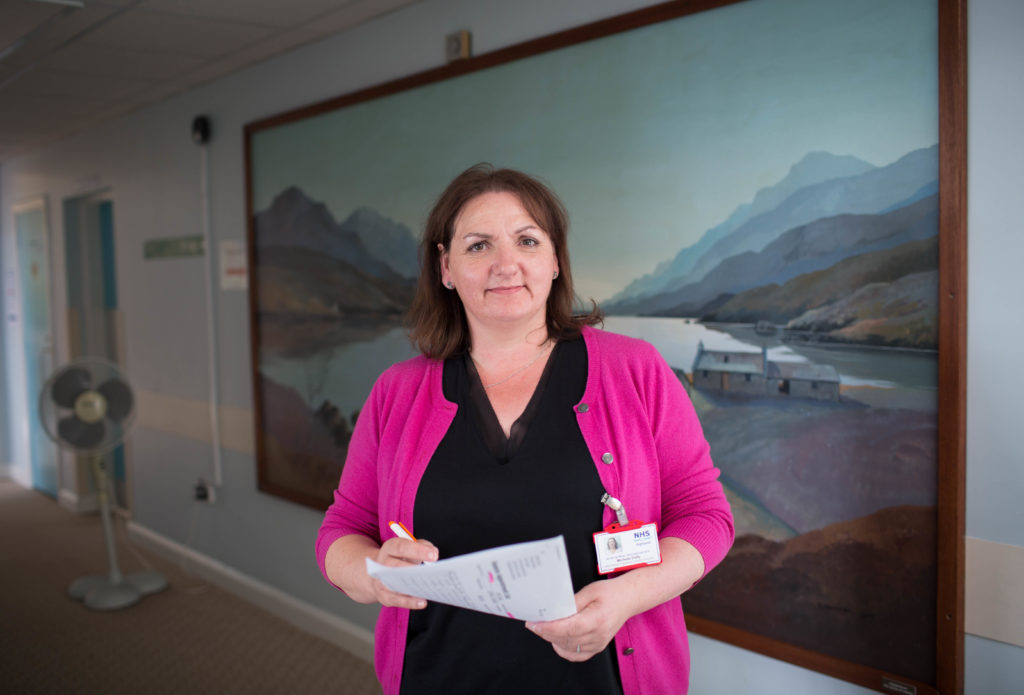 As she drives around the Highlands, Michelle marvels at the scenery and remembers what it was like to be on a ward doing a 12-hour shift. “On a beautiful day it’s lovely,” she says. “But looking to the future, I hope I won’t have to spend four hours in a car to connect to my patients. The more we can use technology, the better.”
As she drives around the Highlands, Michelle marvels at the scenery and remembers what it was like to be on a ward doing a 12-hour shift. “On a beautiful day it’s lovely,” she says. “But looking to the future, I hope I won’t have to spend four hours in a car to connect to my patients. The more we can use technology, the better.”
Michelle would love to see the day when the IT infrastructure would be reliable enough to allow her to run virtual clinics in patients’ own homes from Inverness, using teleconferencing. But poor internet coverage and clunky connections mean that is still some way off.
Various telehealth approaches for COPD have been tried here over the years, and there is a trial taking place to evaluate the mobile phone-based reporting system, Florence Light Touch, which allows patients to send daily updates electronically. “Most people really like it, and it encourages them to take control of their condition,” says Michelle. “Ideally the system would be personalised to the individual. It’s all about putting people in control of their condition.”
When she is at Caithness General hospital in Wick, Michelle uses videoconferencing to run a multi-disciplinary clinic with Lorna Murray, a respiratory consultant at Raigmore, saving patients the three-hour round trip to Inverness. “It’s a great development, because I am learning more about diagnosis, and the patients like the fact that I can carry out the clinical assessment and translate the doctor-speak for them,” she says. “We all work very well together.”
In Caithness, Michelle works also with a newly-appointed respiratory nurse, Mahri Swanson, and other healthcare practitioners, sharing her knowledge and skills. Across her area, she works closely with the local community nurses and GPs who see and manage patients between her visits. “I think one of the most valuable aspects of my role is to share specialist knowledge with the whole multi-disciplinary team,” she says. “Managing respiratory disease well is everyone’s business, and I am keen to share what I know.”
Across Scotland, the number of people living with respiratory disease is increasing, and Michelle is committed to doing whatever she can to make sure that they all receive the standard of care that she gives her patients. To that end, she sits on the Scottish Parliament’s cross-party lung health group, and she will be using her Queen’s Nurse title to get her message across. “We are helping to shape how the service should look right across the country,” says Michelle. “It’s very exciting that NHS Highland is showing the way.”
To learn more about our other Queen’s Nurses involved in specialist conditions, meet Debra.
